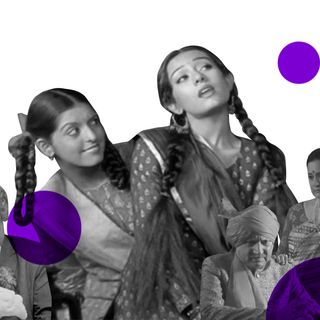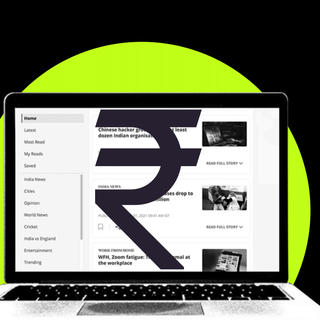
IT Raids Against Anurag Kashyap, Tapsee Pannu Are a Reminder That Celebrities Face Consequences for Speaking Out
Critics say the probe is an excuse to silence anti-government voices.

The Income Tax department raided properties linked to actor-director Tapsee Pannu, filmmaker Anurag Kashyap, and others as part of a three-year-old tax evasion investigation yesterday that is still underway. The probe’s intent has drawn sharp public scrutiny, with opposition leaders and industry members terming it a “political vendetta” to silence voices critical of the government.
Both Pannu and Kashyap have been active in registering their support for the farmers’ movement on social media and have objected to the National Register of Citizens (NRC) and Citizenship Amendment Act (CAA) in the past — all things that position them as critical of the ruling government.
Union Minister Prakash Javadekar called allegations of foul play on agencies’ part “too much,” adding that “probe agencies undertake investigations based on credible information and the matter later goes to courts as well.”
Government officials have claimed that the raids are an extension of the tax evasion probe against Phantom Films, founded by Kashyap, Vikramaditya Motwane, producer Madhu Mantena, and Vikas Bahl. Reliance Entertainment had acquired a 50% stake in 2015. The company was dissolved in 2018 after Bahl faced a sexual assault allegation by a former Phantom employee. Kashyap went his separate way and formed Good Bad Films, his new production company.
The IT Department now is reportedly pillaging across 30 locations in Mumbai and Pune linked to Bollywood celebrities and their associates, purportedly carrying out an investigation in the name of law. The court of public opinion, however, sees this as the deployment of federal institutions for political gain.
“BJP misuses institutions like CBI, ED, IT Dept for political benefits. It’s political vendetta. There’s a dictator who doesn’t want to listen to voices against him. He destroyed all institutions,” RJD leader Tejashwi Yadav told PTI, referring to the Enforcement Directorate’s probe against farmer leaders and student activists.
Activist-lawyer Prashant Bhushan called the raids an attempt to “harass, intimidate & silence those who don’t fall in line” on Twitter. “India has never seen such malafide use of IT dept, ED, NIA, police etc,” he added.
Positioning oneself against the government isn’t a common trait within Bollywood. The camaraderie is well-established, with Akshay Kumar’s role as the poster boy for the BJP deconstructed in detail. “If the government had a message … it seemed Kumar was the messenger,” The Caravan noted in its February cover story. Last month, a raft of celebrities responded to an “international conspiracy” to malign India’s image and toed the government line in a coordinated tweet spree. A paper titled “Rihanna versus Bollywood: Twitter Influencers and the Indian Farmers’ protest” noted incisive evidence “of collusive tweeting” based on timestamps and text. Their silence — during last year’s Citizenship Amendment protests, Delhi riots, caste violence, or any anti-government issue — weighs heavily in contrast to this.
Related on The Swaddle:
Respectfully Disagree: Has the Lockdown Made Celebrities More #Relatable?
India’s entertainment industry — and influencers by extension — have been criticized for remaining mum on key human rights and civil liberty issues and have been urged to use their sway for social justice. A couple of years ago, a selfie of leading actors — with the likes of Shah Rukh Khan, Alia Bhat, and Karan Johar in the frame — with Prime Minister Narendra Modi gathered online censure. Many termed it as the real “tukde-tukde” gang, so as to infer that it is the complicity and silence of these influential figures that allow the democratic fabric to crumble.
Figures like Swara Bhasker, Tapsee Pannu, and Anurag Kashyap have demonstrably broken from this cabal, lending their voices in support of national and social issues. Kashyap visited JNU and Shaheen Bagh during the anti-CAA protests last year. His social media is home to wide-ranging tweets: about farmers’ protest, toxic media coverage, the migrant crisis, muzzled media freedom.
On similar lines is Pannu’s political orientation — who with 4.5 million followers on Twiter, frequently locks horns with pro-government voices. Her recent digital footprints fell in support of climate activist Disha Ravi, Priya Ramani, and farmers’ demands. “If one tweet rattles your unity, one joke rattles your faith or one show rattles your religious belief then it’s you who has to work on strengthening your value system not become ‘propaganda teacher’ for others,” Pannu had tweeted last month.
The consequences borne by those who actively distance themselves from pro-government agencies are chilling but unsurprising. The timing of the tax investigation — revived for “official” reasons — sets it up as a grim consequence for anyone who registers criticism of the ruling party. In ways more than one, the current probe then sits as a cautionary tale.
Arguably, Pannu and Kashyap are better resourced to deal with intimidation tactics, but to ignore the government fire that comes their way would be a grievous oversight. It is but a reminder that there are two classes of celebrities: those who comply get Y+ security and those who resist can be strong-armed using institutional forces.
Dissent itself is a rare facet of celebrity culture — and it might be time to introspect how spectators can respond to this growing but meek force. How celebrities transform their fame to partake in public discourse might be determined by the support and outrage that flows next.
Saumya Kalia is an Associate Editor at The Swaddle. Her journalism and writing explore issues of social justice, digital sub-cultures, media ecosystem, literature, and memory as they cut across socio-cultural periods. You can reach her at @Saumya_Kalia.
Related


Is This Normal? “I Hate Being Tickled”
